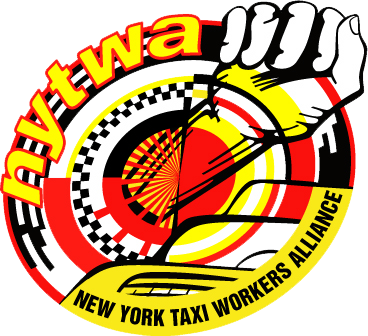“We are committed to a progressive, internationalist, democratic labor movement that stands in steadfast solidarity with workers’ movements of the U.S. and around the world.” Bhairavi Desai, Founder and Executive Director
Our History
Founded in 1998, the New York Taxi Workers Alliance (NYTWA) is the 21,000-member strong union of NYC yellow cab, green car, black car, livery and app-dispatched drivers. We fight for justice, rights, respect and dignity for the over 180,000 licensed men and women who labor 12 hour shifts with little pay and little protection in the city’s mobile sweatshop. Our members come from every community, garage, and neighborhood.Through organizing, direct action, legal and health services, media presence, political advocacy, and the cultivation of allies and supporters, NYTWA — a multi-ethnic, multi-generational union — builds power for one of the most visible, yet vulnerable, immigrant workforces in the city of New York.
In 2012, NYTWA won a livable income raise, first-time regulations of taxi companies, and a Health and Disability Fund for drivers, the first for taxi drivers nationwide and one of the first for independent contractors. In 2011, NYTWA was chartered to build the National Taxi Workers Alliance, the 57th union of the AFL-CIO. The NTWA is the first charter for non-traditional workers since the farm workers in the 1960’s, and the first one ever of independent contractors.
Together, we fight campaigns for structural change in the industry and support individual drivers with comprehensive advocacy and services. NYTWA has increased drivers’ incomes by 35%-45%, secured over $15 million in emergency aid to drivers, and provided pro bono or discounted legal, financial management, and health services to over 10,000 drivers and families.
Building Worker-Power
Our main strategies for building power remain deploying direct actions and membership building to win policy changes and making important interventions to change local and national narratives. Our commitment to membership-driven organizing model has made NYTWA unique.
We’ve pushed the boundaries to include non-traditional organizing in the houses of labor, and pushed for a militant labor movement that is committed to broader social justice values. We bring to realization that worker centers can grow to large size and remain committed to grass-roots organizing.
At various points of our history, we have made choices to take collective action over non-traditional worker issues: formed broad-based coalition against Giuliani’s “Quality of Life” campaigns which targeted communities of color and the poor; organized four anti-war protests and was the first organization to vote against war against Afghanistan and later Iraq; struck over workplace privacy and made connections between surveillance and worker exploitation; held high-profile organizing against anti-Muslim and anti-Sikh racism and workplace violence; and struck against the Muslim ban. We have pledged solidarity strikes with bargaining transit workers and proudly caravanned and protested with many low-wage worker organizations.
We are committed to a progressive, internationalist, democratic labor movement that stands in steadfast solidarity with workers’ movements of the U.S. and around the world.
The historic moment before us requires labor to take a stand against both growing austerity which is crushing the working class and the poor, and the growth of fascism and white supremacy. The poor are being fed hate while the powerful have historic tax cuts and wealth gains. The fascism is rooted in populism which is rooted in primarily economic issues. If we do not organize workers around principled solidarity and progressive values, not only will the fabric of our society go toward a deepening authoritarianism, but it will ultimately create more poverty, hunger and homelessness. These are not easy issues. Even among drivers, who are mostly immigrants and people of color, and workers destroyed by deregulation and the poverty that has followed, there is a confused rhetoric which borders fascism. Our organizing work seeks to take that on directly. Without doing so, no labor organization will be able to build real worker-power.


